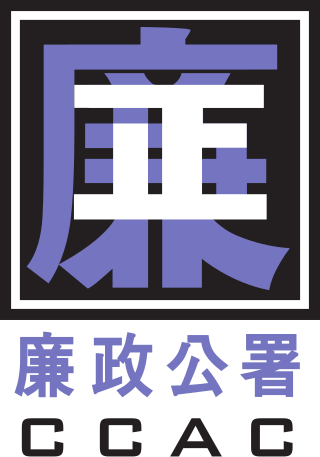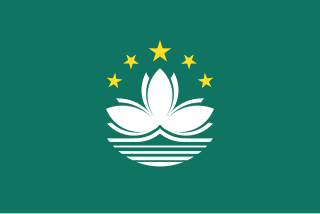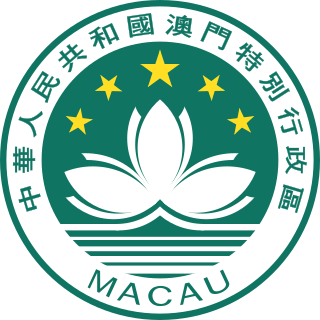Related Research Articles
Politics of Macau is a framework of a politically constrained multi-party presidential system,dominated by the People's Republic of China. It includes the legislature,the judiciary,the government,and a multi-party system. Executive power is exercised by the government,led by the Chief Executive.

A prosecutor is a legal representative of the prosecution in states with either the adversarial system,which is adopted in common law,or inquisitorial system,which is adopted in civil law. The prosecution is the legal party responsible for presenting the case in a criminal trial against the defendant,an individual accused of breaking the law. Typically,the prosecutor represents the state or the government in the case brought against the accused person.

Macau law is broadly based on Portuguese law,and therefore part of the civil law tradition of continental European legal systems. Portuguese law is itself highly influenced by German law. However,many other influences are present,including Chinese law,Italian law,and some narrow aspects of common law.

The Supreme People's Procuratorate of the People's Republic of China (SPP) is the highest national agency responsible for legal prosecution and prosecutorial investigation in China. The SPP reports to the National People's Congress (NPC).

The Commission Against Corruption is the statutory independent anti-corruption body of Macau with the primary objective of combating corruption,bribery,and other illicit activities in both the public and private sectors. Established in 1999 under the Article 59 of the Macau Basic Law,the CCAC is headed by the Commissioner,who reports directly to the Chief Executive of Macau.

TDM - Teledifusão de Macau,S. A. provides public broadcasting services in Macau. By running five digital terrestrial television channels,one satellite television channel and two radio channels,TDM provides local audiences with a wide range of content in Macau's two official languages,Chinese (Cantonese) and Portuguese,as well as having time-slots for English as well as Indonesian and Tagalog,which reflects the multicultural nature of the city,with 95 percent of the population being Chinese and five percent made up of Portuguese and other ethnic groups.
Ao Man Long was the first Secretary for Transport and Public Works of the Macau Special Administrative Region of the People's Republic of China,from 20 December 1999 to 6 December 2006.

The National Anticorruption Directorate,formerly National Anticorruption Prosecution Office,is the Romanian agency tasked with preventing,investigating and prosecuting corruption-related offenses that caused a material damage to the Romanian state. The institution deals with the fight against high corruption offences,which have caused damage greater than €200,000 or if the object of the crime is property or sums of money amounting to over €10,000.
Articles related to Macau include:

The following outline is provided as an overview of and topical guide to Macau:
Legislative elections were held in Macau on 15 September 2013 according to the provisions of the Basic Law of Macau. This election was the first of its kind succeeding the reform of the Legislative Assembly that created four new seats;two new geographical constituency seats and two new functional constituency seats. Out of a total of 33 seats,14 were elected by universal suffrage under the highest averages method,while 12 were voted on from the Functional constituency,and 7 from nomination by the Chief Executive.

The Second term of Fernando Chui Sai On as Chief Executive of Macau,officially considered part of "The 4th term Chief Executive of Macau",relates to the period of governance of Macau since the transfer of sovereignty over Macau,between 20 December 2014 and 20 December 2019. Fernando Chui Sai On was reelected in mid 2014 by 400-member Selection Committee.
Operation Fox Hunt is a Chinese government covert global operation whose purported aim is anti-corruption under Chinese Communist Party general secretary Xi Jinping's administration. As of 2017,it has led to the arrest of over 40 of its 100 most wanted globally. It has been accused of targeting Chinese dissidents living abroad to stop their activism under the guise of returning corrupt Chinese nationals to China to face criminal charges. Kidnappings and other forms of coercion have been used to repatriate individuals.
Dong Hong is a former Chinese politician. He was investigated by China's top anti-graft agency in October 2020. He was a senior disciplinary inspector under Wang Qishan until 2017,when Wang was chief of China's top anti-corruption agency,the Central Commission for Discipline Inspection (CCDI).

Sulu Sou Ka Hou is a Macau resident who served as a member of the Macau Legislative Assembly. In 2018 he was the youngest person in that position.
Meng Yongshan is a former Chinese procurator. As of June 2021 he was under investigation by China's top anti-corruption agency. Previously he served as chief prosecutor and party branch secretary of Qinghai People's Procuratorate.
Chief Executive elections were held in Macau on 26 July 2009 for the third term of the Chief Executive of Macau (CE),the highest office of the Macau Special Administrative Region. Fernando Chui was elected without contest after incumbent Chief Executive Edmund Ho was ineligible for re-election due to having served two terms.

Case 3/2008 in Macau was a habeas corpus case heard before the Macau Tribunal of Ultimate Instance. The applicant A filed a request of habeas corpus to the court,as he believed his elder sister B was in unlawful detention by the Judiciary Police in Macau,when in fact B had been transferred to the Public Security Bureau of Zhuhai,China,one day before the request. The court has no jurisdiction outside Macau,so it ruled that there was no further need to adjudicate,on grounds of supervening impossibility of the remedy sought. The judgment,however,went on to cite a previous decision by the same court in 2007,which allowed a similar application. The court this time reiterated that before specific legislation is introduced,it is illegal to transfer fugitives to mainland China,and the acts by the authority in the present case "discredit justice,undermine the Rechtsstaat and do not bring prestige to the Macau Special Administrative Region." The case has since been cited by jurists in academic papers concerning the lack of extradition legislation between Macau and mainland China.
Song Man Lei is a judge from Macau. She is the first female judge to sit on Macau's highest appellate court,the Court of Final Appeal.
References
- ↑ "Macau News". Macau News. 7 June 2023.[ dead link ]
- ↑ "Outgoing chief prosecutor urges better legal system". macaonews.org. 11 December 2014.[ dead link ]
- ↑ Lo, Shiu Hing (1999). "Gambling and Organised Crime Towards the End of the Stanley Ho Connection". China Perspectives . 26: 63. ISSN 2070-3449.
- 1 2 3 Carvalho, Raquel (14 July 2017). "Macau's former chief prosecutor jailed 21 years for crimes". South China Morning Post. Archived from the original on 2 February 2022. Retrieved 24 July 2024.
- ↑ "Ho Chio Meng sentenced to 21 years of imprisonment". Macau News. 14 July 2017. Archived from the original on 15 August 2020. Retrieved 24 July 2024.
- ↑ Carvalho, Raquel (14 July 2017). "Cash bags, hidden sauna: secret life heard in Macau official's trial". South China Morning Post. Archived from the original on 20 April 2024. Retrieved 24 July 2024.